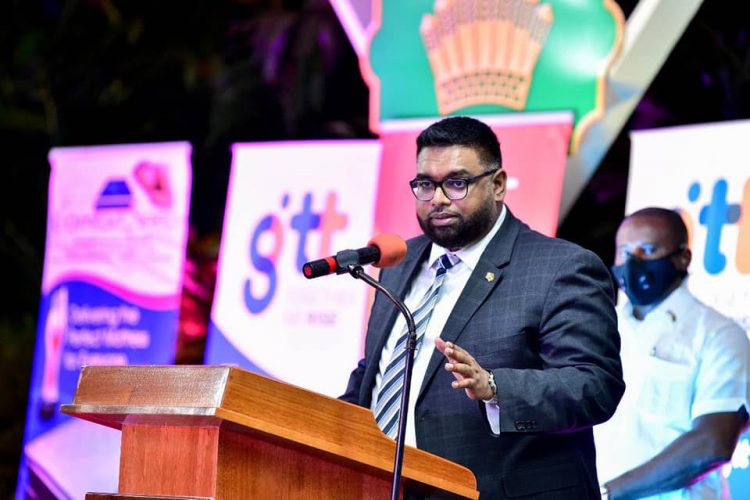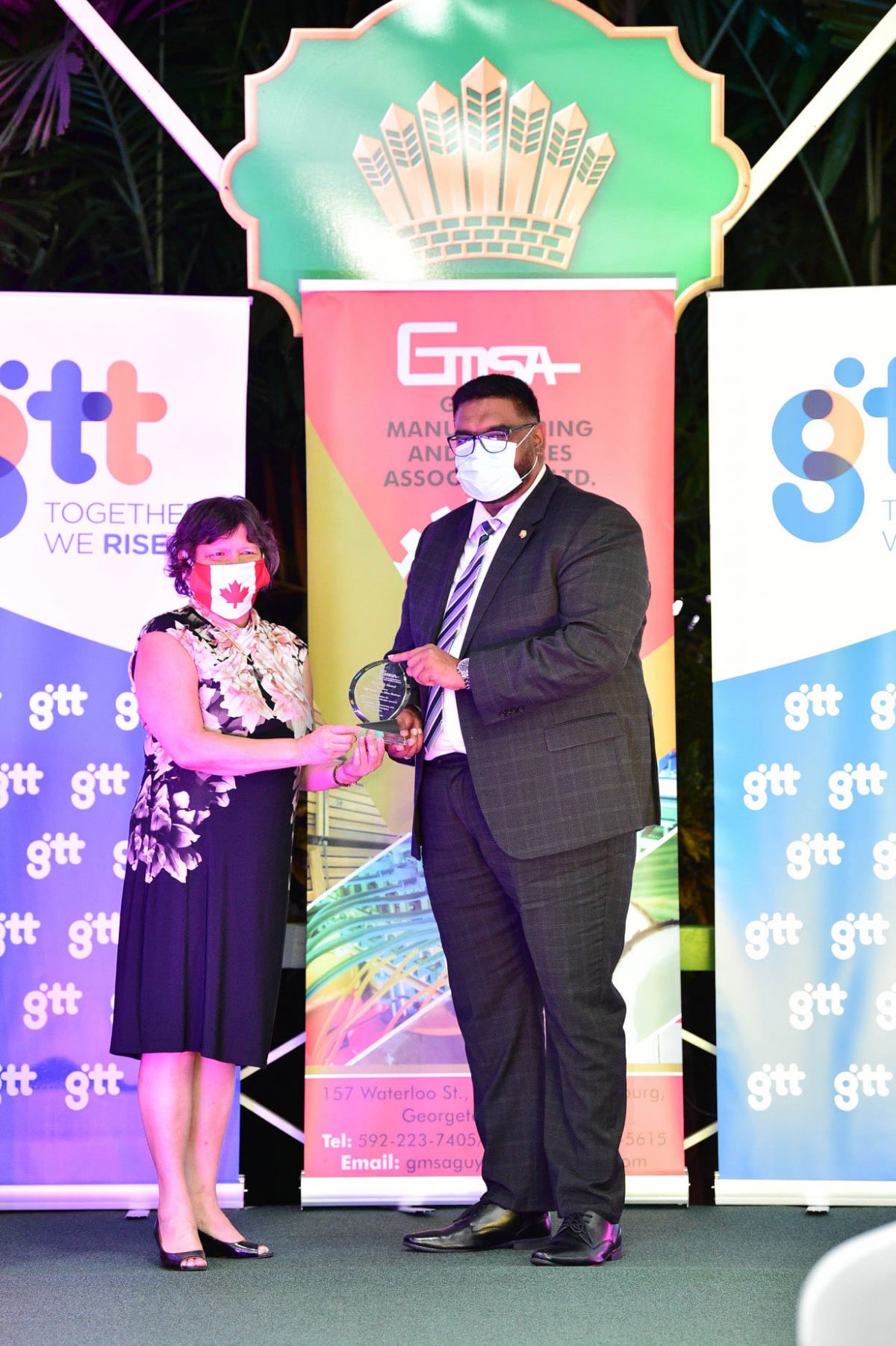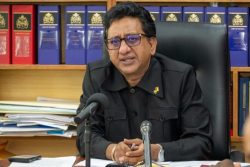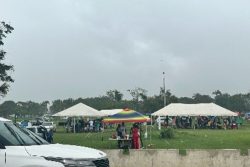President Irfaan Ali last evening charged the private sector to be more aggressive in its lobbying of CARICOM to remove trade barriers.
Ali, who was the guest speaker at the Guyana Manufacturing and Ser-vices Association (GMSA) annual awards ceremony held at State House last evening, posited that while government will do its part in its push to have CARICOM remove the red tape on products from Guyana, the private sector needs to also do its part.
“I want to say to the President of the Guyana Manufacturing and Services Association that your engagement with CARICOM must be bold. It is time we bring down the barriers to trade. It is time we stake out the place. And while we have the capacity to invest in food security, the private sector needs to push hard on all the barriers that prevent our goods and services from entering a free market, an open market, a unified market in CARICOM,” the President stressed.

“This is not only a duty for the government. This is a responsibility for the private sector. The private sector and the manufacturing association must see themselves as integral. They have an integral role, integral part to play; not a complaining role or complaining part,” he added.
In a bid to assist local farmers in accessing regional export markets, Minister of Agriculture Zulfikar Mustapha had said that the Guyana Government is in discussions with CARICOM in hopes of securing the relaxation or removal altogether of what it sees as some rigid non-tariff measures on local food produce. This has been a decades-old problem.
Mustapha had told this newspaper that Guyana’s farmers have fresh fruits and vegetables to supply sister CARICOM countries, but because of the sometimes harsh sanitary and phytosanitary non-tariff barriers, food is left here to rot. He said he sees that as a wastage of food, labour and revenue, that could impact not only this country but the importing ones as well, as their citizens could see decreased prices at their markets.
The President echoed similar sentiments and said that Guyana has the potential to assist not only itself, but CARICOM in the area of food security and his government will implement measures to make this possible.
But Ali stressed the vital role of the private sector in making it possible and pointed out that it was the reason that his government has been so keen on ensuring private sector representation and input in all of its developmental program-mes.
“It is for this reason that we are involving the private sector in every aspect of development. A leader in the private sector led the local content dialogue. In every single board the private sector is involved, but the private sector must be bold enough to recognize where their challenge is, where their shortcomings is,” he said.
Further, he added, “We too have to understand that if we are to benefit from the opportunities to come, we have to change our mode of doing business. We have to come together, we have to form consortiums. The family approach to business will fast disappear with the scale of opportunities that will come, and the only way we can benefit from the scale of opportunities to come is if we understand that we have to work together. We have to work together to improve our competitiveness. We have to work together to improve our competitive strength and to increase our market share, not only in Guyana but CARICOM and then beyond.”
Ali laid out a five-prong development plan which encompasses economic transformation in five foundational areas.
The first component of the development plan, according to the President, will be initiatives aimed at creating higher levels of sustained economic growth.
Second will be the modernisation of the primary sectors – agriculture, fisheries, and forestry, as Ali assured that this country’s traditional sectors will not be neglected because of the oil and gas sector.
Transformative interest
“I want to assure our Guyanese brothers and sisters that while a lot of attention has been and is being placed on oil and gas, over the last three months we have seen remarkable interest, transformative interest, in agriculture, fisheries, forestry and mining. The results of these interests you will see next year. To integrate the local private sector with multinationals with large scale investors and I am proud to say to you that in the coming year we will all be happy with what will unfold. The level of collaboration, integration and investments that will be made,” he explained.
Another part of his plan will be installation of transformational infrastructure; including for the support of manufacturing and services while there will simultaneously be the rebalancing of the economy to boost value-added production.
He said that government will be improving efficiency, encouraging innovation and ensuring greater competitiveness here.
“Above all of this will be our ability to service the needs of the new economy, our ability to have the right mix of human resources to boost human development. It is for this reason that we are realigning the educational output with educational requirement and you will see the unfolding of twenty thousand scholarships to ensure we build the capacity right here at home to take the opportunities that are coming our way,” the President stressed.
He believes that as the economy expands, it will open the floodgates to business opportunities for locals and they must be equipped to maximise them.
And as the country develops, the President reasoned that it will put Guyana in the fiscal space to better address deficiencies in its productive sectors. “As part of this exercise, we will promulgate policies to expand, strengthen and diversify manufacturing and services,” he said.
The President also said that human resource development holds a key priority for his government and given that Guyana is gearing for an oil & gas economy, plans are on stream for “a world class, world rated institute training centre right here in Guyana,” catering to the sector. “We will achieve it, we must achieve it,” he contended.
“This will not only provide training for Guyanese but for human resources across the oil and gas sector…,” he added.
Among other plans will be the establishment of a Wales Development Authority, which will “be tasked with not only the development of agriculture but agro industry processing facilities, manufacturing industrial development and this facility will see special incentives; tax incentives, fiscal incentives developed so that we can attract development in the Wales Development Authority.”
Ali said that government continues to engage investors and analyze the number of proposals for developmental projects here but at the core of all of its decision-making will be that Guyanese reap the benefits of their resources.
He said for all of the projects planned, the private sector can be assured that its involvement will be needed.
“As far as possible, we would seek private sector investment in making these investments possible. We will seek private sector input. It is the business of the private sector to generate business and create business opportunities. It is the business of the government to facilitate that creation and the creation of wealth. So while the government creates the enabling environment, to facilitate the growth, the private sector must be proactive in going after the opportunities,” Ali said.
He called on Guyana’s citizenry to set aside partisan thinking and work with his government to create a Guyana that not only they will enjoy in the near term, but leave a developed infrastructure for future generations.
“We have to be bold in our thinking. We have to be innovative. Do not doubt our ability to win; to be ahead of the competition. Do not! Our objective is not to be in competition with ourselves. It is to be ahead of the game and together we have to build the infrastructure,” he said.
All of us, you like the government or you don’t like the government, you have to love Guyana. And in loving Guyana, you have to embrace the concept of transformation in moving the country forward. This is not a political agenda. This is an agenda for being the best we can be. For the future of tomorrow. It is not an agenda that should be kicked around as a political toy, it is an agenda that seeks to outline clearly and definitively, where our country is going and what all of us have to do in taking our country forward,” he added.










